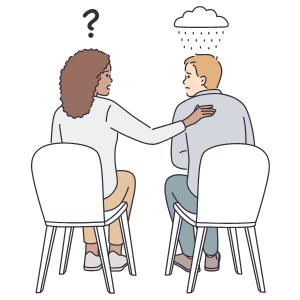Depression is a pervasive and debilitating mental health condition that affects millions of people worldwide. It can interfere with daily life, relationships, and overall well-being. While there are various treatment options available, including medication and lifestyle changes, one of the most effective and widely used therapies for depression is Cognitive Behavioral Therapy (CBT).
Understanding Depression

Before delving into the specifics of CBT, it’s essential to understand what depression entails. Depression is more than just feeling sad; it is a complex mental health disorder characterized by persistent feelings of sadness, hopelessness, and a lack of interest or pleasure in once-enjoyed activities. It can also lead to physical symptoms such as changes in appetite and sleep patterns, fatigue, and difficulty concentrating.
How Cognitive Behavioral Therapy Works
CBT is a form of psychotherapy that is based on the idea that our thoughts, feelings, and behaviors are interconnected. It is a structured, goal-oriented approach that helps individuals identify and modify negative thought patterns and behaviors that contribute to their depression. Here’s how CBT works in helping individuals with depression:
- Identifying Negative Thought Patterns: CBT begins by helping individuals become aware of their negative thought patterns, often referred to as “cognitive distortions.” These distortions include all-or-nothing thinking, catastrophizing, and personalization, among others. By recognizing these distortions, individuals can start to challenge and reframe them.
- Restructuring Thoughts: Once negative thought patterns are identified, CBT teaches individuals how to reframe them in a more balanced and rational way. For example, someone who constantly thinks, “I’m worthless,” might learn to challenge this thought by looking for evidence to the contrary and considering alternative perspectives.
- Behavioral Activation: Depression often leads to withdrawal from social activities and a decrease in enjoyable experiences. CBT helps individuals set and work towards specific behavioral goals, encouraging them to re-engage with activities that once brought them pleasure and a sense of accomplishment.
- Problem-Solving Skills: CBT equips individuals with problem-solving skills to address life stressors and challenges that may contribute to their depression. This helps individuals gain a sense of control and mastery over their lives.
- Homework and Self-Monitoring: CBT often involves homework assignments, such as keeping a thought journal, tracking mood, or practicing new coping skills between sessions. This reinforces the therapeutic process and allows individuals to apply what they’ve learned in real-life situations.
Benefits of CBT for Depression
- Evidence-Based: Numerous studies have demonstrated the effectiveness of CBT in treating depression. It is considered one of the most evidence-based psychotherapies for this condition.
- Time-Limited: CBT is typically a time-limited therapy, meaning it can produce significant results in a relatively short period, often around 12 to 20 sessions.
- Empowerment: CBT empowers individuals to take an active role in their recovery. It provides them with practical tools and strategies to manage their symptoms and prevent relapse.
- Long-Term Benefits: Research suggests that the skills learned in CBT can have lasting benefits, reducing the risk of future depressive episodes.
- Complement to Medication: CBT can be used on its own or in conjunction with medication. It offers an alternative or supplementary approach for those who prefer not to rely solely on medication.
Cognitive Behavioral Therapy is a highly effective and versatile treatment for depression. By helping individuals identify and modify negative thought patterns, behaviors, and emotions, CBT equips them with valuable tools to manage and alleviate their symptoms. It’s important to note that the success of CBT often depends on the individual’s commitment to the therapeutic process and the skill of the therapist. When conducted by a trained professional, CBT can be a life-changing intervention that helps individuals regain control over their lives and find relief from the burden of depression. If you or someone you know is struggling with depression, consider reaching out to a mental health professional to explore the benefits of CBT.